
Background information
Dr Martens: 4 pairs of boots, 4 stories
by Anika Schulz
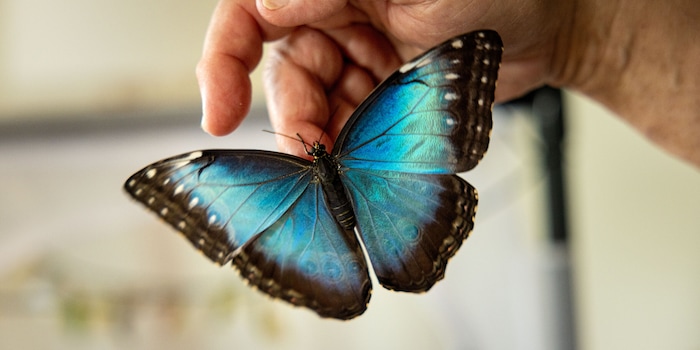
If there was a Swiss ambassador for butterflies, it would probably be Marc de Roche aka Papa Papillon. The 79-year-old from Bern has dedicated his work to butterflies for 20 years. This is his story.
«My hair reached all the way down to my shoulders.» Grinning mischievously, Marc de Roche sits at a wooden table in his apartment within a former Bernese mansion. In the 79-year-old’s mind, it’s still the height of the hippie era. An era in which he’s a big fan of Che Guevara; one in which he fights against capitalism and for love instead of war.
We believed we could make the world a better place.
But Marc de Roche doesn’t get that far. His life is taken over by the corporate grind. He becomes an IT specialist and works hard as a father of two. His dream of a better world balls up in a cocoon deep inside him.
But then, in 2001, once his kids have spread their wings, the cocoon threatens to break open.
At the edge of the woods, Marc sees nettles – and on them, black caterpillars. He’s transported back to his childhood. «Those should turn into butterflies, shouldn’t they?» he thinks to himself and takes a few of the caterpillars home. Back in his garden, he places them on nettles, looking forward to the butterflies soon to flutter around. But the next day, he’s met with disappointment.
The caterpillars have disappeared. Marc de Roche is at a loss.
I had lost touch with the world. But I was very much in touch with computers.
It’s not long before Marc is flooded with advice from internet forums. He’s enthralled; someone seems to have an explanation for the disappearing caterpillars. «The nettles are too close to the road. Caterpillars don’t like exhaust fumes,» writes an anonymous user. Marc de Roche is sceptical. But being a pragmatist, he’s not one to give up so soon. He ventures a new attempt – this time, with the nettles behind his house. And lo and behold, the caterpillars stay.
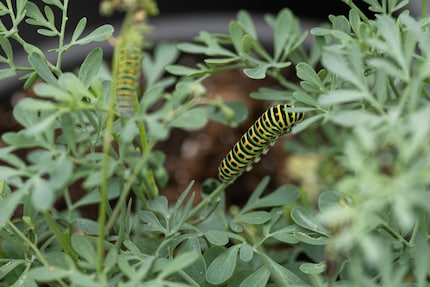
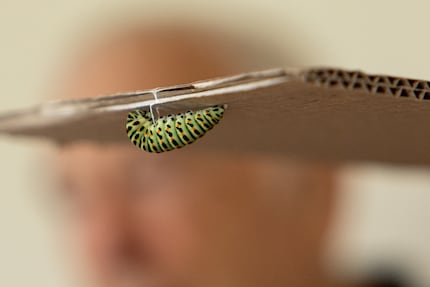
Marc de Roche’s fascination grows. Like a hungry caterpillar, he devours any and all information he can find about butterflies. He starts raising caterpillars in his garden and exchanges advice with other amateurs – and pros. In doing so, he notes a shortcoming: experts only reach specialist circles with their knowledge, and not the general public.
This bothers Marc de Roche. Why? Because it’s citizens who can take specific action to prevent the species' extinction by hosting caterpillars.
There’s no lack of flowers for butterflies, but there is a lack of food for caterpillars.
Back in the day, fennel, carrots and dill could be found in every garden. Today, female swallowtails must fly miles to lay their eggs. Marc de Roche is concerned about this. The desire to make the world a better place starts to stir again in his cocoon – until the pupa rips open.
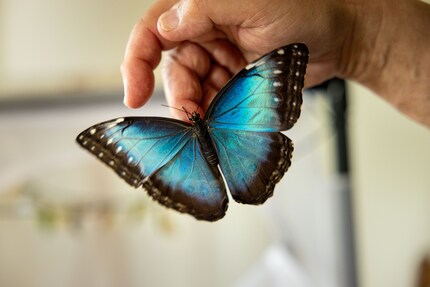
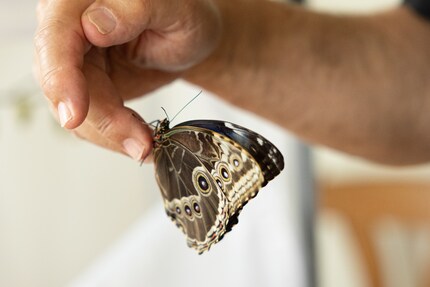
In 2003, Marc de Roche starts to spread knowledge about butterflies to the public as «Papa Papillon». An ambassador for the insects, he visits school classes, hold presentations and acts as a consultant for other butterfly breeders. «Caterpillar breeders,» he corrects me. That’s what he prefers to call them. After all, «No caterpillar, no butterfly. That’s where it all starts.» Companies such as Möbel Pfister or Switzerland Tourism hire him and his butterflies for their ad films. You’ll see the elegant fliers flutter into the air in wedding scenes and the like.
Marc de Roche’s name recognition is on the rise. He begins to collaborate with the Papiliorama to breed tropical butterflies for exhibitions. He invents a netted enclosure for keeping caterpillars, the aerarium and founds an association for hobby breeders named Swiss Butterfly Breeders. «We have 2,300 followers on Facebook,» Marc de Roche says proudly.
Today, 20 years later, the 79-year-old man from Bern no longer flitters and flutters through Switzerland as quickly as he once did. He spends a lot of time in his garden as well as on some urban property that he also uses for raising caterpillars. He continues to hold presentations and participate in events, though less often. After the death of his wife, Marc decided not to wait too long to fulfil a dream of his: in 2024, he would like to travel to Andorra to research some very special caterpillars and moths.
To me, the Spanish moon moth is the most beautiful butterfly in the world.
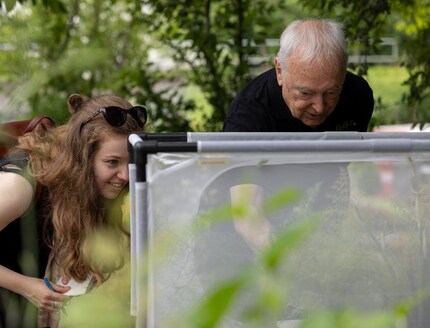
Even if Marc de Roche doesn’t beat his wings quite as strongly anymore, his dreams remain steadfast. He’s still actively involved in environmental projects, such as «Jardins Papillons», which aims to create a butterfly corridor between Biel and Kerzers. Numerous private and public gardens have already been made butterfly-friendly. And the project aims to do even more. A huge garden nature park for summer birds is to be created in the Seeland region. Some may say Marc de Roche is a dreamer, but his vision seems to have taken wings:
I believe we’re making the world a better place. At least on a small scale.
This feels like a throwback to Marc de Roche in his hippie era. And to Che Guevara, who noted that to do something, you have to love it – and that to love something very much, you have to believe in it to the point of madness.
In the next article, I’ll show you what you can do to help the butterflies.
I love anything with four legs or roots - especially my shelter cats Jasper and Joy and my collection of succulents. My favourite things to do are stalking around with police dogs and cat coiffeurs on reportages or letting sensitive stories flourish in garden brockis and Japanese gardens.
Interesting facts about products, behind-the-scenes looks at manufacturers and deep-dives on interesting people.
Show all